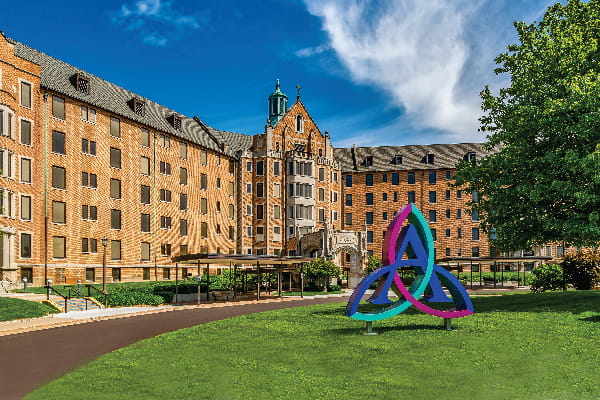
Comprehensive stroke care at Ascension Borgess
When you or a loved one has symptoms of a stroke, every second counts. Ascension Borgess Hospital in Kalamazoo, Michigan, has earned the designation Comprehensive Stroke Center by The Joint Commission*, a national healthcare accreditation organization. That means we deliver 24/7 emergency stroke care for even the most complex cases. Our highly specialized stroke care helps support better outcomes at a time when you need it most.
Neurologists, neurosurgeons and ER doctors specialize in treating stroke and transient ischemic attacks (TIA). We quickly work together to help improve blood flow to the brain, stop a brain bleed, and help prevent future strokes. We’ll connect you to rehabilitation therapists who specialize in stroke care and rehabilitation.
*The Joint Commission is an independent accrediting organization. This accrediting body sets standards in healthcare to improve healthcare quality and safety. This recognition reflects our experience and advanced care to help improve stroke recovery outcomes.
Ascension Borgess Comprehensive Stroke Center
Ascension Borgess Hospital 2024 recognitions for multispecialty stroke care
Healthgrades America’s 100 Best Hospitals for Stroke Care ● (2024, 2023)
Healthgrades Specialty State Ranking Awards: Stroke Care ● Ranked #1 | (2024, 2023)
Your doctors and care team have the expertise to diagnose and treat different types of strokes. The type of stroke you have affects your treatment and recovery. There are three main types of stroke.
- Ischemic stroke is caused by a blood clot that travels to the brain. If a patient receives hospital care within three hours of the first symptoms of an ischemic stroke, a clot-busting medication may be given. Patients who receive this medication are more likely to fully recover.
- Hemorrhagic stroke is caused by a blood vessel that ruptures and bleeds into the brain.
- Transient ischemic attack (TIA), also called a mini-stroke, is caused by a clogged artery that slows the blood supply to the brain. Having a TIA may increase your risk of having a stroke. A TIA is an emergency, just like a stroke. Recognizing and treating TIAs can lower the risk of a major stroke. If you have a TIA, your healthcare team can find the cause and take steps to prevent a major stroke.
Are you at risk for stroke?
By answering these questions, you can start to better understand your risk:
- Are you over 65?
- Do you have a family history of stroke?
- Do you smoke?
- Have you had a prior stroke or heart attack?
- Do you have high blood pressure, diabetes, high cholesterol, heart disease, peripheral artery disease, AFib, heart valve disease or sickle cell anemia?
If you answered "yes" to any of these questions, it may be important for you to talk to your primary care doctor about your risk for stroke.
Recognize the symptoms of stroke — BE FAST
The first step in getting treatment for stroke quickly is recognizing the warning signs. Do this for yourself and your loved ones. Follow these BE FAST guidelines:
Balance: Check for sudden loss of balance.
Eyes: Ask if vision is lost or unclear.
Face: Look for face drooping or an uneven smile.
Arm: Check for arm weakness.
Speech: Listen for speech difficulty.
Time: Time to call 911 right away
If you or a loved one is experiencing warning signs of a stroke — every second counts. Call 911 and go to the nearest ER.
Stroke recovery and rehabilitation
Having a stroke recovery care plan after a stroke is important. We listen to understand you and your health concerns. Then, your care team of doctors, nurses, physical therapists, occupational therapists and speech pathologists works with you to create a care plan that's right for you. Our Ascension Borgess Inpatient Rehabilitation care team provides therapies and monitors your progress to help you meet your goals.
Your care doesn't stop when you leave the hospital. We can connect you to transitional care in your home, an outpatient rehabilitation center or skilled nursing facility. Our goal is to improve your quality of life after a stroke.
Stroke support group at Ascension Borgess
At Ascension Borgess, we provide a stroke support group for stroke survivors, including those who may still be in the hospital, loved ones and caregivers. During support group meetings, we provide encouragement, emotional support and discuss many different topics. Our stroke support group meets on the third Tuesday of every month from 3:00pm to 4:00pm. To join, please call in or use the link below.
Video call link: https://meet.google.com/cyd-krms-ake
Or dial: (US) +1 929-256-1184 PIN: 160 951 538#
More phone numbers: https://tel.meet/cyd-krms-ake?pin=9554783818040
